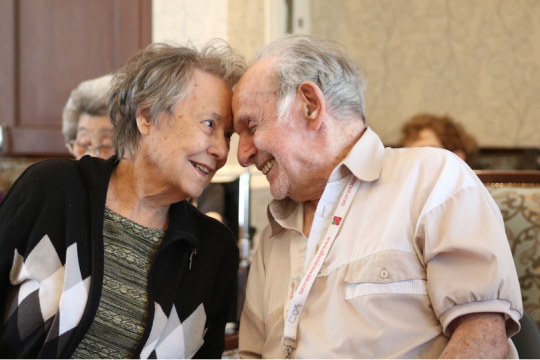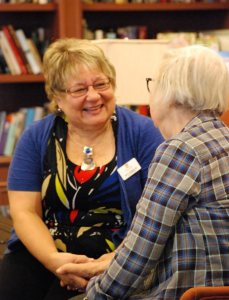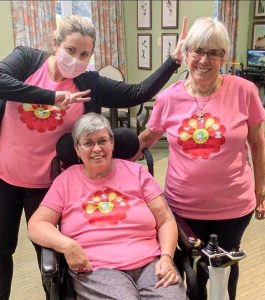
Communication is fundamental to our ability to express ourselves, and to our relationships with other people.
Yet, Alzheimer’s disease and dementia gradually diminishes a person’s ability to communicate. The disease changes the way your older adult hears, processes, and responds to conversation. This means that the individual finds it more and more difficult to express themselves clearly, and to understand what others say.
Common changes in communication
Each person with dementia is unique and difficulties in communicating thoughts and feelings are very individual. There are many causes of dementia, each affecting the brain in different ways.
Some changes you might notice include:
- Difficulty in finding a word
- The content of their speech might not make sense
- The person may not understand what you are saying or only grasp part of it
- Normal social conventions of conversations may be lost – they might interrupt or ignore a speaker, or fail to respond
- They may have difficulty expressing emotions appropriately
- Writing and reading skills may deteriorate
Preparing to communicate with a person with dementia
Minimise background noise
People with dementia can find it difficult to concentrate in any environment, including their own home. Removing or reducing distractions will substantially improve your success. Try shutting windows to reduce sounds from outside or turning the TV or radio down or off, remembering of course to ask the person’s permission to do so.
Reflect, Plan, and Remain Calm
When speaking to someone with dementia, being patient, calm, and clear is important for two main reasons:
- Progressive memory loss impacts their ability to organise and express their thoughts
- The past can merge with the present, which creates confusion
It is important that caregivers have a plan. What are you going to talk about ? Try to remain calm and relaxed and let the person have all the time they need to respond. Think about previous conversations you have had with them and what helped you to communicate well then.
Body language
Did you know that just 7% of communication is the words we use? The rest is body language and tone of voice. Even if a person with dementia cannot follow what you’re saying, they can still pick up on these non-verbal cues. That is why calm, conscious communication is so important when you are caring for or spending time with someone who has dementia.
Bilingualism and dementia
Sometimes people with Alzheimer’s or other dementias revert to the first language they learned, their mother tongue. Maximising communication that doesn’t rely on words, such as facial expressions, hand and body gestures, pictures and symbols, can help. In some cases, you may need to recruit an interpreter.
Tips to Communicating with Someone with Dementia
Here are some essential tips to help make your communication easier:
- Approach the person from the front and identify yourself.
- Get on their level – literally. Avoid standing over them.
- Keep sentences short and simple, focusing on one idea at a time.
- Speak directly to the person and maintain eye contact – it shows you care about what he or she is saying.
- Always allow plenty of time for the person to process and understand what you’ve said.
- Be patient – give them time to speak, wait for the person to search around that for the word.
- Listen as closely as possible. They may lose their thread at times, so give them time to respond and gently redirect to the original topic. Try not to finish sentences.
- Ask yes or no questions. For example, “Would you like some coffee?” rather than “What would you like to drink?”
- Avoid criticizing or correcting. Instead, listen and try to find the meaning in what the person says. Repeat what was said to clarify.
- Offer clear, step-by-step instructions for tasks. Lengthy requests may be overwhelming.
- Give visual cues. Demonstrate a task to encourage participation.
- It can be helpful to use orienting names whenever you can, such as “Your son Jack”.
Irregular routines and inconsistent communication styles among family and caregivers can also create confusion, so aim for as much consistency as possible.
Things To Keep In Mind
 It feels like the first time
It feels like the first time
While you may have seen your loved one several times during a day, it can still seem like the first time for them. It’s also important for caregivers to remember that the changes experienced by the person with dementia are frightening.
Cultivate a caring attitude
People retain their feelings and emotions even though they may not understand what is being said, so it is important to always maintain their dignity and self-esteem.
Encourage and praise as much as possible. Make sure to acknowledge the great things your loved one is doing and reinforce happy and loving thoughts.
Take care of yourself
There will be good days and bad days. Learning about dementia can help people cope with interactions they find stressful, as they witness their loved one changing. Caring for a family member who is living with dementia or illness can be rewarding, it can also be tiring, so be kind to yourself and be sure to read our tips for avoiding caregiver burn-out.
Download: Tips To Avoid Caregiver Burn-Out
Memory Care at All Seniors Care
 At All Seniors Care, we go above and beyond to make sure that our residents are comfortable. Our assisted living homes are prepared to take care of any senior dementia symptoms, whether mild or advanced. We have senior living communities with exceptional memory care services so that residents feel safe and supported at all times.
At All Seniors Care, we go above and beyond to make sure that our residents are comfortable. Our assisted living homes are prepared to take care of any senior dementia symptoms, whether mild or advanced. We have senior living communities with exceptional memory care services so that residents feel safe and supported at all times.
Our state of the art sensory rooms are perfect for relaxing in, listening to music, or reminiscing on positive memories. Click on the link to read how we enhance the quality of life of seniors with dementia. For older adults whose loved one is experiencing early cognitive decline yet still wishes to live independently, explore the benefits of BLOSSOM Living.
Explore options near you. We are also building senior communities across the country so that more Canadians have access to these services.
Resident with dementia playing guitar at The Courtyards on Eagleson Retirement Residence in Ottawa:
Writer – Julianna McLeod
Julianna is a health and wellness expert at All Seniors Care. Her mission is to create content that empowers seniors to form sustainable solutions for lasting health and happiness. She is an experienced writer, editor, and Recreational Therapist living in Toronto.